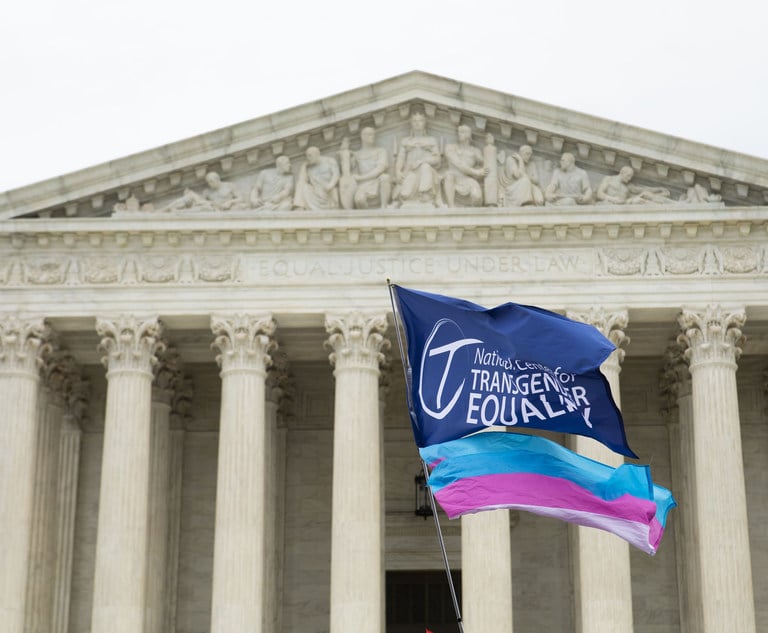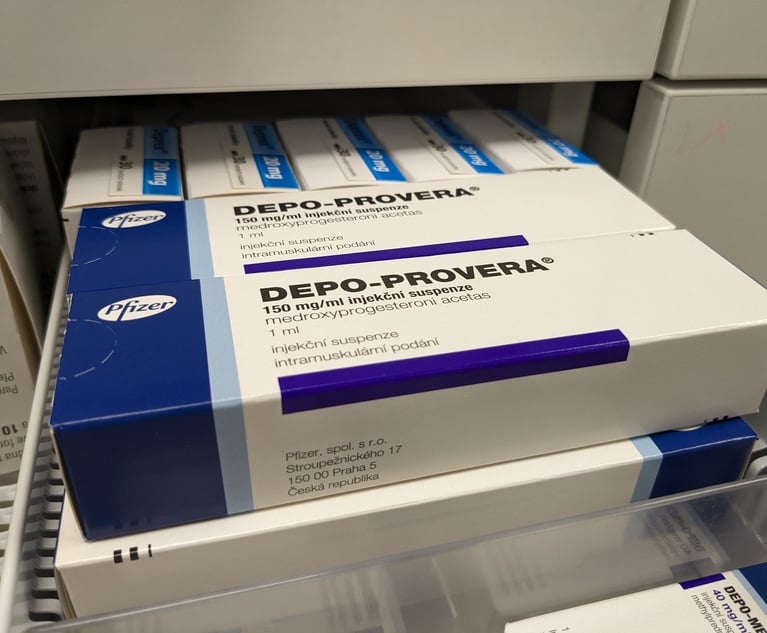 Quinn Emanuel Urquhart & Sullivan sign (Photo: Jason Doiy/ALM)
Quinn Emanuel Urquhart & Sullivan sign (Photo: Jason Doiy/ALM)Koch Brothers' Nonprofit Asks US Supreme Court to Keep Donor Names Secret
A circuit split and the "exceptionally important" First Amendment issues raised help make this case "an ideal vehicle" for the high court to clarify its position on the disclosure of group affiliations, argue the petitioners, who are represented by Quinn Emanuel Urquhart & Sullivan.
August 26, 2019 at 05:15 PM
3 minute read
A conservative charity with ties to the Koch brothers has asked the U.S. Supreme Court to block California's attempts to identify its donors.
Attorneys with Quinn Emanuel Urquhart & Sullivan, representing the Americans for Prosperity Foundation, filed a cert petition Monday seeking to overturn a 2018 ruling from the U.S. Court of Appeals for the Ninth Circuit that upheld California Attorney General Xavier Becerra's demands to see the names and addresses of the 501(c)(3) nonprofit's largest contributors.
"Unless this Court intercedes, the Ninth Circuit has opened the door for the major donors of thousands of charities to be exposed and chilled through California's dragnet," Quinn Emanuel's Derek Shaffer, counsel of record for the petitioners, wrote. "If this Court declines review, the resulting chill will be profound and lasting."
The case, which drew amicus briefs from privacy advocates, think tanks and the NAACP, stems from the attorney general's practice of collecting tax information from charities that operate in California. For years, the office allowed organizations to file only their Form 990s, the broad disclosure documents submitted annually to the U.S. Internal Revenue Service, and not the Schedule B forms that detail donor information. In 2010, however, under then-Attorney General Kamala Harris, the state charity registry began sending "deficiency letter" to charities demanding to see their Schedule Bs.
Harris, and later Becerra, argued that the donor information is kept confidential but that the attorney general's office has an interest in collecting it to ensure the charity is not engaging in fraud or other unfair business practices. The Americans for Prosperity Foundation, established by libertarian businessmen and brothers Charles Koch and the late David Koch, balked at the attorney general's demand for their donors' names, calling it a violation of its First Amendment right to free association.
The foundation sued and in 2016, the late U.S. District Judge Manuel Real of California's Southern District issued a permanent injunction barring the attorney general from collecting the donors' information. In September 2018, a three-judge panel for the U.S. Court of Appeals for the Ninth Circuit sided with Becerra and vacated the injunction.
"We hold that the California attorney general's Schedule B requirement, which obligates charities to submit the very information they already file each year with the IRS, survives exacting scrutiny as applied to the plaintiffs because it is substantially related to an important state interest in policing charitable fraud," Judge Raymond Fisher wrote for the panel.
In its petition to the high court, the Americans for Prosperity Foundation argues that the Ninth Circuit's decision "cannot be squared" with "well-settled" constitutional protections for private association.
"The court sought to justify this holding by citing cases upholding disclosure requirements governing elections," Shaffer wrote. "But there is a categorical distinction between the election context, where compelled public disclosure can be an affirmative good, and the non-election context, where compelled disclosure (even to government itself) is at best a necessary evil."
A circuit split and the "exceptionally important" First Amendment issues raised help make this case "an ideal vehicle" for the high court to clarify its position on the disclosure of group affiliations, the petitioners argue.
This content has been archived. It is available through our partners, LexisNexis® and Bloomberg Law.
To view this content, please continue to their sites.
Not a Lexis Subscriber?
Subscribe Now
Not a Bloomberg Law Subscriber?
Subscribe Now
NOT FOR REPRINT
© 2024 ALM Global, LLC, All Rights Reserved. Request academic re-use from www.copyright.com. All other uses, submit a request to [email protected]. For more information visit Asset & Logo Licensing.
You Might Like
View All
New Class Action Points to Fears Over Privacy, Abortions and Fertility

Deception or Coercion? California Supreme Court Grants Review in Jailhouse Confession Case
5 minute read
Court rejects request to sideline San Jose State volleyball player on grounds she’s transgender
4 minute readTrending Stories
- 1Judicial Ethics Opinion 24-68
- 2Friday Newspaper
- 3Judge Denies Sean Combs Third Bail Bid, Citing Community Safety
- 4Republican FTC Commissioner: 'The Time for Rulemaking by the Biden-Harris FTC Is Over'
- 5NY Appellate Panel Cites Student's Disciplinary History While Sending Negligence Claim Against School District to Trial
Who Got The Work
Michael G. Bongiorno, Andrew Scott Dulberg and Elizabeth E. Driscoll from Wilmer Cutler Pickering Hale and Dorr have stepped in to represent Symbotic Inc., an A.I.-enabled technology platform that focuses on increasing supply chain efficiency, and other defendants in a pending shareholder derivative lawsuit. The case, filed Oct. 2 in Massachusetts District Court by the Brown Law Firm on behalf of Stephen Austen, accuses certain officers and directors of misleading investors in regard to Symbotic's potential for margin growth by failing to disclose that the company was not equipped to timely deploy its systems or manage expenses through project delays. The case, assigned to U.S. District Judge Nathaniel M. Gorton, is 1:24-cv-12522, Austen v. Cohen et al.
Who Got The Work
Edmund Polubinski and Marie Killmond of Davis Polk & Wardwell have entered appearances for data platform software development company MongoDB and other defendants in a pending shareholder derivative lawsuit. The action, filed Oct. 7 in New York Southern District Court by the Brown Law Firm, accuses the company's directors and/or officers of falsely expressing confidence in the company’s restructuring of its sales incentive plan and downplaying the severity of decreases in its upfront commitments. The case is 1:24-cv-07594, Roy v. Ittycheria et al.
Who Got The Work
Amy O. Bruchs and Kurt F. Ellison of Michael Best & Friedrich have entered appearances for Epic Systems Corp. in a pending employment discrimination lawsuit. The suit was filed Sept. 7 in Wisconsin Western District Court by Levine Eisberner LLC and Siri & Glimstad on behalf of a project manager who claims that he was wrongfully terminated after applying for a religious exemption to the defendant's COVID-19 vaccine mandate. The case, assigned to U.S. Magistrate Judge Anita Marie Boor, is 3:24-cv-00630, Secker, Nathan v. Epic Systems Corporation.
Who Got The Work
David X. Sullivan, Thomas J. Finn and Gregory A. Hall from McCarter & English have entered appearances for Sunrun Installation Services in a pending civil rights lawsuit. The complaint was filed Sept. 4 in Connecticut District Court by attorney Robert M. Berke on behalf of former employee George Edward Steins, who was arrested and charged with employing an unregistered home improvement salesperson. The complaint alleges that had Sunrun informed the Connecticut Department of Consumer Protection that the plaintiff's employment had ended in 2017 and that he no longer held Sunrun's home improvement contractor license, he would not have been hit with charges, which were dismissed in May 2024. The case, assigned to U.S. District Judge Jeffrey A. Meyer, is 3:24-cv-01423, Steins v. Sunrun, Inc. et al.
Who Got The Work
Greenberg Traurig shareholder Joshua L. Raskin has entered an appearance for boohoo.com UK Ltd. in a pending patent infringement lawsuit. The suit, filed Sept. 3 in Texas Eastern District Court by Rozier Hardt McDonough on behalf of Alto Dynamics, asserts five patents related to an online shopping platform. The case, assigned to U.S. District Judge Rodney Gilstrap, is 2:24-cv-00719, Alto Dynamics, LLC v. boohoo.com UK Limited.
Featured Firms
Law Offices of Gary Martin Hays & Associates, P.C.
(470) 294-1674
Law Offices of Mark E. Salomone
(857) 444-6468
Smith & Hassler
(713) 739-1250







